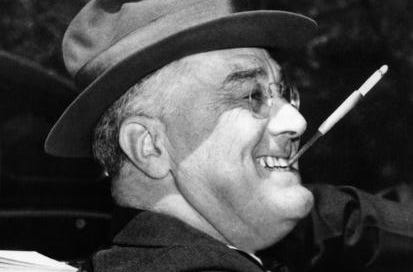March 4, 1933
FDR’s First Inaugural Address
I know that I’ve pulled a lot from this address, but it is an important speech, where he outlines the kind of President he intends to be.
In this excerpt, he addresses his views on orienting our foreign policy — to that of being a good neighbor.
All emphasis mine.
In the field of world policy I would dedicate this nation to the policy of the good neighbor-the neighbor who resolutely respects himself and because he does so, respects the rights of others — the neighbor who respects his obligations and respects the sanctity of his agreements in and with a world of neighbors.
If I read the temper of our people correctly, we now realize, as we have never realized before, our interdependence on each other; that we cannot merely take, but we must give as well; that if we are to go forward we must move as a trained and loyal army willing to sacrifice for the good of a common discipline, because, without such discipline, no progress is made, no leadership becomes effective.
We are, I know, ready and willing to submit our lives and property to such discipline because it makes possible a leadership which aims at a larger good.
This I propose to offer, pledging that the larger purposes will bind upon us all as a sacred obligation with a unity of duty hitherto evoked only in time of armed strife.
With this pledge taken, I assume unhesitatingly the leadership of this great army of our people, dedicated to a disciplined attack upon our common problems.
Action in this image and to this end is feasible under the form of government which we have inherited from our ancestors.
The United States — and its citizens — should move forward together, stand together “willing to sacrifice for the good of a common discipline” because without it “no progress is made.”
People are screaming for progress, but unwilling to sacrifice for the common good. That is how we got here.
We must be willing to throw off this attack on the work of FDR. We must work together to create real progress in this country.
“Action in this image and to this end is feasible under the form of government which we have inherited from our ancestors.”
Every day I will endeavor to be as courageous as Franklin D. Roosevelt.
Here’s the video:
Some historic context — As the Nazi party is on the rise in Germany in 1933, its power built on fostering the resentments of the German people — FDR ascends to power in the US promising policy built on being a “good neighbor” and taking care of one another, with a higher purpose than simply making money.
He promises to be a “neighbor who respects his obligations and respects the sanctity of his agreements in and with a world of neighbors.”
Sounds a lot like the post WWII world built by the Greatest Generation, who grew up with this outstanding leader as President of the United States.
And when did Inauguration Day change from March to January? From the White House Historical Association:
The Twentieth Amendment, also known as the “lame duck” amendment, was proposed and authored by progressive Nebraska Senator George Norris in 1922. While communications and travel during the late eighteenth and nineteenth centuries were more difficult, necessitating a nearly four-month gap between winning election and taking the Oath of Office, by the twentieth century much had improved in terms of travel and technology, allowing for an earlier Inauguration date. Norris also sought to tackle a larger problem. Previously, a president that lost reelection could govern during the lengthy lame duck session without having to be responsible to voters. Shortening this lame duck period was meant to strengthen democracy and avoid a future Constitutional crisis.
After introducing this legislation five times, Norris was finally successful on his sixth try in March 1932. The Amendment passed Congress and was ratified by the States in January 1933.
Today, presidents serve a four-year term, beginning on January 20 at noon, and ending four years from that date and time exactly.
Through Sunday, I’ll treat you to more amazing prose from FDR’s first inaugural address, because it’s just that good.
On Monday, we’ll move on to his first Fireside Chat.
Be sure to subscribe so you don’t miss your Daily Delano — quotes to inspire you from our 32nd President.
As a public service, The Daily Delano will always remain free to all subscribers — but if you want to support a working gal with a paid subscription, I’m much obliged.




The contrast to tRump is actually painful. It's impossible to stay positive when every day is worse than the one before.